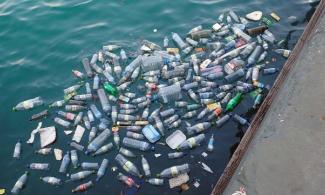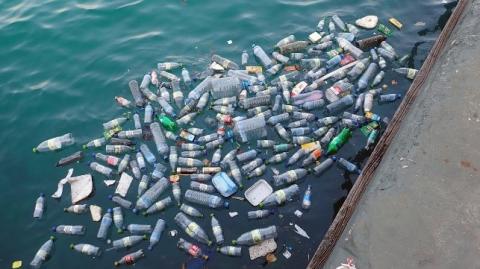
“Available statistics are evidences of everyone’s contributions to this challenge. Only one sector could not have been responsible for the over 200,000 metric tonnes of plastic wastes that find their way into the water bodies every year in the country. Only one sector could not have been responsible for the ranking of Nigeria as one of the top 20 countries with the worst plastic waste management.”

The United Nations Information Centre (UNIC), Lagos, has warned that unless the world stops the indiscriminate disposal of used plastics, the number of plastics in the ocean globally would be far and above aquatics animals by 2050.
The global body also disclosed that at least 8 million tonnes of used plastics are thrown into the ocean annually by users.
Speaking on Tuesday at the Muetala Muhammed Airport (MMA), Lagos, at the first World Environment Day 2018 celebration organised by the Federal Airports Authority of Nigeria (FAAN) in conjunction with the Nigerian Environmental Society (NES), Dr. Ronald Kayanja, the Secretary-General of United Nations, who was represented by a Director UNIC, Lagos, lamented that people indiscriminately disposed used plastics.
He said apart from the health hazards to aquatic animals, it also constitutes challenge on humans especially cancer and other ailments.
June 5 of every year is recognized by the UN as World Environmental Day and it’s dedicated to awareness creation on environmental sustainability.
According to him, in order to check the rising poor discard of used plastics, several countries around the world, including some African countries, had criminalised the use of plastics, stressing that Nigeria could take a cue from this.
In his welcome address, Engr. Saleh Dunoma, Managing Director of FAAN said that the menace caused by used plastics could not be emphasized in the nation’s aviation industry.
Dunoma, who was represented at the occasion by Engr. Salisu Daura, noted that large chunks of industrial and consumer products are either made up of plastics materials or packed in plastic container.
He noted that water in plastic bottles, chemicals in plastic containers, plastic keyboards, plastic computer monitors, plastic carriage bags and plastic buckets and so on are not only problems for the earth, they are also bad for human health and ecology with avoidable environmental hazards.
"The airports do not produce plastic products but they provide avenues for installations of plastic products in form of facilities as well as selling of items packed in plastic containers, thereby contributing to plastic waste generation into the immediate and the larger environment," he said.
“Available statistics are evidences of everyone’s contributions to this challenge. Only one sector could not have been responsible for the over 200,000 metric tonnes of plastic wastes that find their way into the water bodies every year in the country. Only one sector could not have been responsible for the ranking of Nigeria as one of the top 20 countries with the worst plastic waste management.”
In his presentation, ‘Beat Plastic Pollution in Aviation Sector,’ Professor Babajide Alo stated that globally, 300 billion pounds of plastics are produced yearly around the world.
He, however, noted that 10 per cent of this number ends in ocean while 70 per cent of the total number that found themselves in the ocean eventually sinks and caused damage to aquatic animals and humans.
He called for strong legislation against single usage of plastic as it is currently done in Kenya and Rwanda, stressing that with such Act in place, health hazards to humans would be reduced.
He also urged the Federal Government to introduce additional tax to companies dealing in production of plastics, while such organizations could also put up a deposit charge on consumers of plastic containers.
"Incentives should be provided by the government to attract investments on biodegradable plastics. Plastic items that can be re-used should always be recycled to ensure they do not end up in the environment and to avoid producing more plastics," he said. “The world cant totally do away with plastics, but its usage can be curtailed. Recycling of plastics should be instituted as a policy backed by laws, rather than the existing resort to goodwill of the people to recycle."